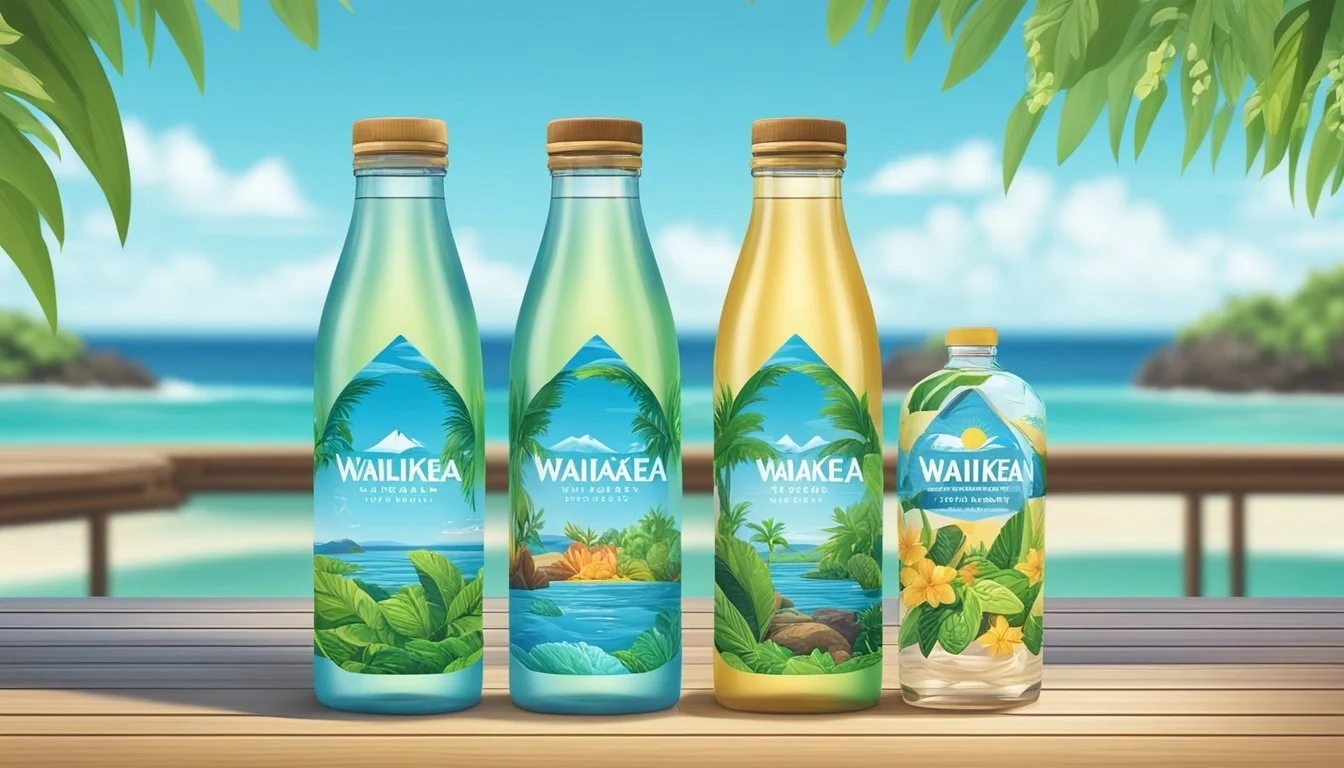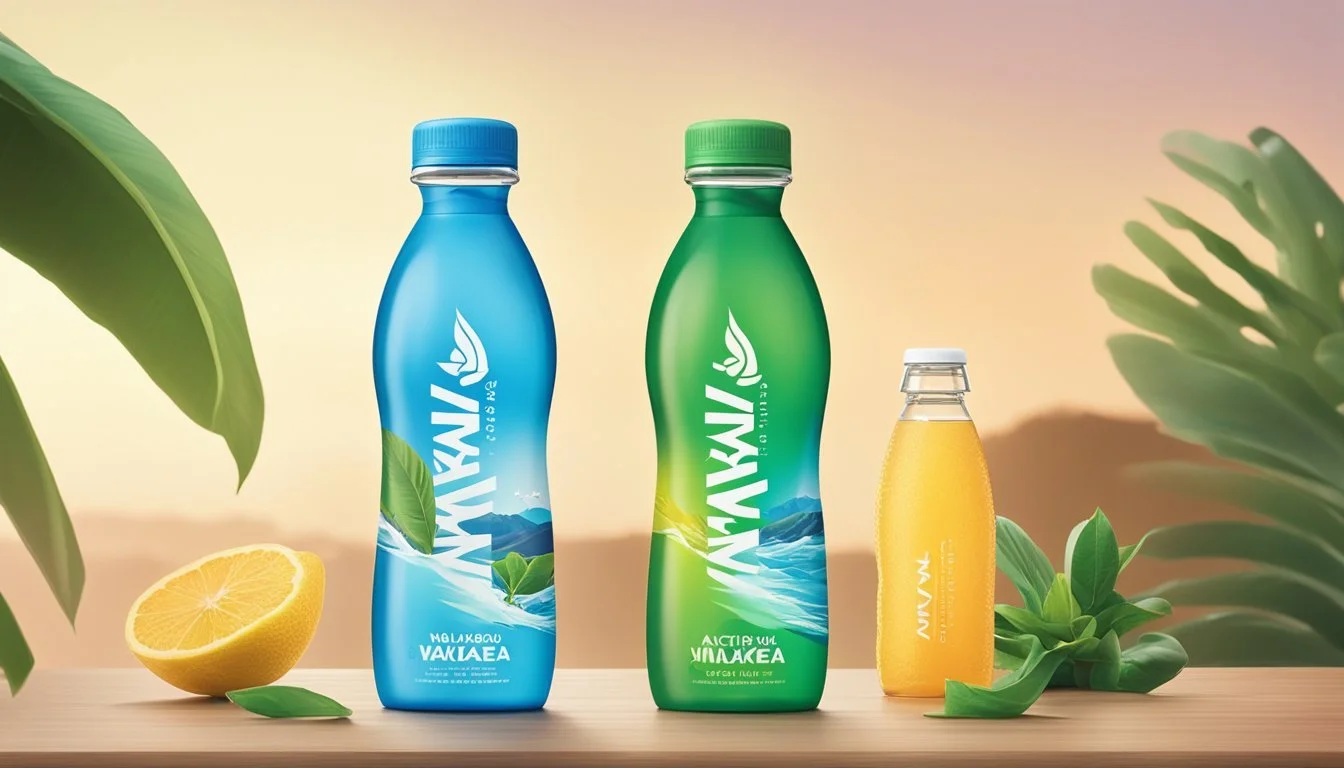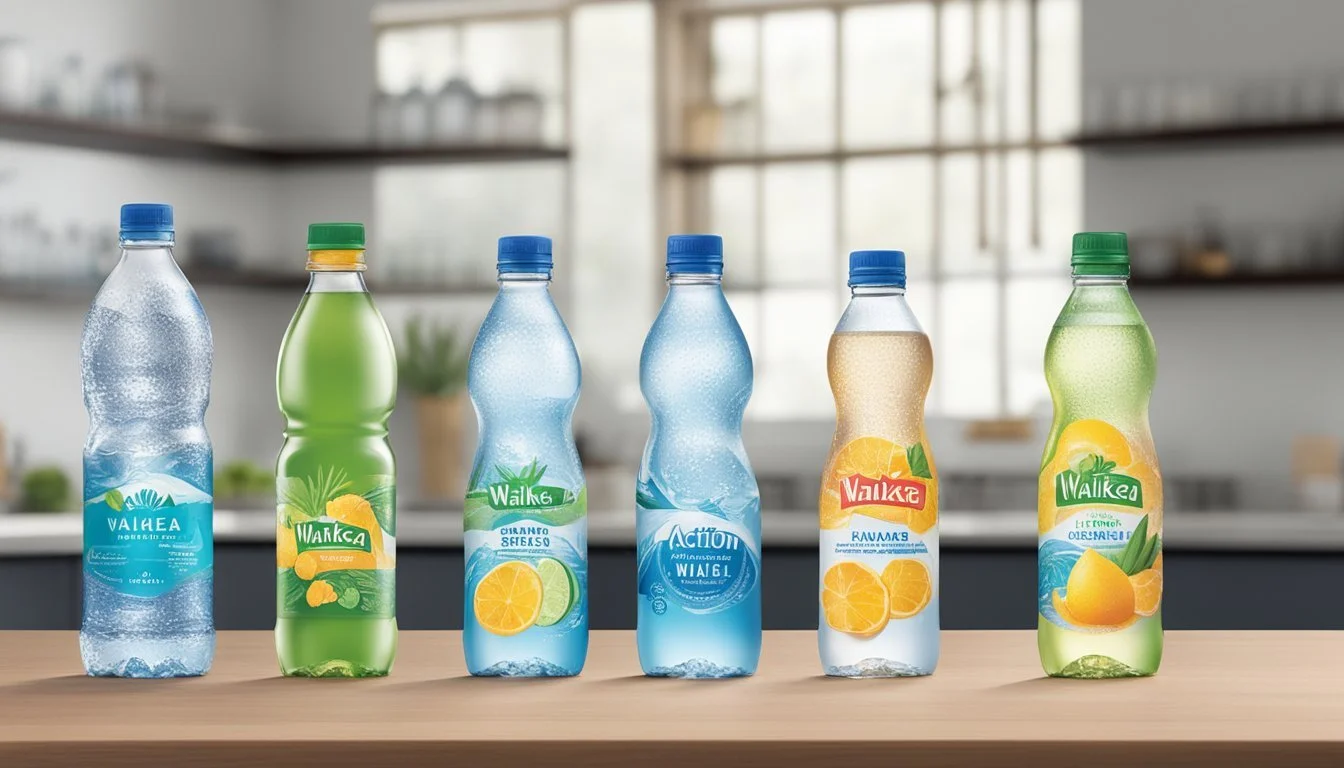Waiakea vs. Action
Comparative Analysis of Bottled Water Brands
Choosing between Waiakea and Action bottled water brands can be challenging for consumers seeking high-quality hydration. Each offers unique benefits that cater to different preferences and lifestyles. Waiakea water boasts a natural filtration process as water filters through 14,000 feet of volcanic rock, resulting in a lighter, crisper taste and healthy alkaline minerals.
Action water, on the other hand, undergoes a rigorous purification process using micro-filters, reverse osmosis, and ultraviolet exposure to achieve 99.9% purity. This water is then infused with electrolytes and ionized to create an alkaline water with a pH of 9.5 or higher, ensuring consistency in quality and taste.
Both brands offer eco-friendly packaging solutions, with Waiakea’s bottles being BPA-free and 100% RPET, and Action committed to sustainable practices. With these factors in mind, readers can make an informed decision on which brand best meets their needs.
Understanding Bottle Water
Bottled water has evolved considerably, with brands offering various options that cater to health and environmental concerns. This section explores the historical development of bottled water and the differences between bottled and tap water.
History and Rise of Bottled Water
Bottled water dates back centuries, initially sold in glass bottles by spa towns known for their mineral springs. The commercial market began thriving in the 1970s, thanks to innovations in plastic bottling and a growing focus on health and fitness.
Major water brands emerged, emphasizing purity and mineral content. Today, sustainability has become central, with companies like Waiakea using renewable energy and recycled plastic. This evolution reflects consumer priorities for convenient, healthy, and environmentally friendly hydration options.
Bottled Water vs. Tap Water
The debate between bottled water and tap water centers on quality, taste, and environmental impact. Bottled water often boasts higher purity levels and a consistent taste profile, which many prefer. High-end brands, including Waiakea, highlight unique features like high pH levels and natural sourcing.
In contrast, tap water is typically regulated and tested for safety but may contain contaminants or vary in taste. The environmental impact is a significant concern with bottled water, given plastic waste. Efforts to recycle and use sustainable materials are crucial to addressing these issues.
Health and Hydration Essentials
Staying hydrated is essential for maintaining overall health and well-being. Choosing the right bottled water can significantly impact hydration levels, as well as provide important minerals and electrolytes.
Benefits of Proper Hydration
Proper hydration is fundamental to every bodily function. It aids in regulating body temperature, maintaining blood pressure, and supporting cardiovascular health. The recommended daily water intake varies, but consuming around eight glasses a day serves as a good benchmark.
Hydration also helps in nutrient absorption and digestion. Dehydration can lead to headaches, fatigue, and decreased cognitive function. For active individuals, adequate hydration ensures peak physical performance and quicker muscle recovery.
Minerals and Electrolytes in Drinking Water
Minerals and electrolytes like calcium, magnesium, and potassium are critical for bodily functions. Waiakea water is naturally rich in these elements, which support bone health and muscle function. The presence of silica in Waiakea water is particularly beneficial for skin and nails.
Action water, depending on the source, may also offer similar benefits, but checking the mineral content is essential. The alkaline pH of Waiakea water helps neutralize acidity in the body, potentially reducing acid reflux and improving digestion.
By choosing water with a balanced mineral composition, one can enhance overall health and hydration effectiveness.
Evaluating Water Quality
Water quality is critical in determining the health benefits and safety of bottled water. Key factors include pH levels and the presence of contaminants, both of which play significant roles in evaluating the overall quality and purity of the water.
Significance of pH Levels in Water
The pH level of water is a measure of its acidity or alkalinity, which is expressed on a scale from 0 to 14. Neutral pH is considered 7.0. Waiakea water is known for its natural alkalinity with a pH range of 7.6 to 8.2, derived from its volcanic source. Action water, in contrast, typically has a neutral pH around 7.0, often adjusted through purification processes.
Alkaline water is often preferred by health-conscious consumers as it may help neutralize acidity in the body. This can support various bodily functions, including digestion and hydration. Waiakea’s naturally high pH offers these benefits without the need for artificial enhancements. Action, while neutral in pH, is consistent and widely available, appealing to those who prefer a classic taste profile.
Brand pH Level Source Description Waiakea 7.6 - 8.2 Volcanic wells in Hawaii Action ~7.0 (Neutral) Purified municipal sources
The Impact of Contaminants on Water Purity
The presence of contaminants significantly affects water purity and safety. Contaminants such as heavy metals, bacteria, and chemicals can pose health risks if present in high concentrations. Waiakea water, sourced from volcanic wells, is naturally filtered through porous lava rock, reducing the likelihood of such contaminants.
Action water undergoes extensive purification processes such as reverse osmosis and carbon filtration to ensure its safety. These methods are effective in removing a wide range of contaminants, thereby guaranteeing a high level of water quality. Consumers can be confident in the safety of both brands due to their rigorous purification standards.
Monitoring and maintaining low levels of contaminants is crucial. Bottled water should meet or exceed standards set by regulatory bodies, such as the Environmental Protection Agency (EPA) and the Food and Drug Administration (FDA). Both Waiakea and Action adhere to these standards, ensuring their water is safe for consumption.
Comparing Waiakea and Essentia Bottled Waters
Waiakea and Essentia are both popular choices among bottled water enthusiasts, each offering unique features that set them apart. Understanding these distinctions can help consumers make more informed decisions based on their preferences and needs.
Waiakea: Natural Hawaiian Volcanic Water
Waiakea is sourced from a volcanic well in Hawaii, giving it a unique mineral composition. Its pH ranges from 7.6 to 8.2, classifying it as naturally alkaline. Waiakea water stands out for its natural alkalinity, achieved without artificial processing. This water contains electrolytes and essential minerals, which contribute to its distinctive taste and potential health benefits.
Eco-conscious efforts are also a highlight: Waiakea is certified Carbon Neutral, and over 5% of its revenue goes to nonprofits globally. The preservation of purity is essential, as Waiakea is bottled directly at the source to maintain its fresh quality.
Essentia: Ionized Alkaline Water
Essentia is known for its ionization process, resulting in an alkaline pH of 9.5 or higher. The water undergoes micro-filtration, reverse osmosis, and ultraviolet exposure to ensure 99.9% purity. Electrolytes are then added to enhance taste and hydration benefits. The meticulous process ensures consistency in quality and composition, which can be appealing to consumers looking for predictable and uniform water properties.
Essentia offers a reliable option for those seeking high alkaline water with a specific and controlled mineral balance. Its high pH level is designed to neutralize acidity in the body, making it a preferred choice for performance-focused individuals or those prioritizing hydration.
Source and Filtration Methods
Waiakea and Action are two notable brands with distinct approaches to sourcing and filtrating their water. Waiakea’s water originates from natural Hawaiian sources, while Action employs advanced purification techniques.
Hawaiian Aquifers and Volcanic Filtration
Waiakea sources its water from the base of Mauna Loa volcano in Hawaii. Snowmelt and rainwater filter through thousands of feet of porous volcanic rock, naturally enriching the water with minerals.
These natural aquifers offer a unique combination of purity and mineral content, making Waiakea water renowned for its taste and health benefits. The filtration through volcanic rock is a natural process that enhances the water's alkalinity and adds minerals such as silica, which may support bone, hair, skin, and heart health.
Reverse Osmosis and Purification Processes
Action Bottled Water employs a different method. This brand uses reverse osmosis, a rigorous filtration process that removes impurities and contaminants from the water. Through this method, water passes through a semi-permeable membrane that filters out particles as small as ions.
The purification ensures a high level of cleanliness, making Action water extremely pure. This process may strip the water of minerals found in naturally sourced water, but it guarantees the removal of any harmful substances. Action’s approach provides a clear, taste-neutral product suitable for those prioritizing absolute purity in their drinking water.
Sustainability and Environmental Considerations
Waiakea and Action both highlight their sustainability and environmental efforts in unique ways. These efforts range from eco-friendly practices and renewable resources to managing their carbon footprint.
Eco-Friendly Practices and Renewable Resources
Waiakea uses high-grade 100% rPET (post-consumer recycled PET) for its bottles. This choice significantly reduces energy consumption by 85% and water usage by 99% compared to traditional virgin plastic bottles. Additionally, Waiakea sources its water from an aquifer with a renewable recharge rate of 1.4 billion gallons per year. The bottling facility operates with 33% renewable energy, showcasing a strong commitment to sustainable resource use.
Action Water focuses on minimizing plastic waste by offering biodegradable and compostable packaging. Their facilities utilize advanced filtration systems to reduce water waste during production. Moreover, Action sources its water from naturally replenishing springs, ensuring that the extraction process does not deplete local ecosystems. Action also emphasizes the use of solar energy at their bottling plants, further contributing to environmental sustainability.
The Carbon Footprint of Bottled Water Brands
Waiakea proudly holds the distinction of being the first U.S. bottled water brand to be certified Carbon Neutral. This certification is achieved through a combination of using renewable energy at their facilities and offsetting emissions by partnering with reforestation projects. Moreover, Waiakea donates 5% of its revenue to nonprofits focused on environmental conservation, which indirectly helps to mitigate its carbon footprint.
In contrast, Action Water has implemented a comprehensive carbon reduction plan that involves optimizing logistics to reduce transportation emissions. They utilize carbon accounting platforms to track and reduce their overall carbon emissions. Action partners with environmental organizations to support carbon offset projects, aiming for a future goal of complete carbon neutrality.
Both brands demonstrate significant efforts in minimizing their environmental impact, though they employ different strategies and initiatives to achieve their sustainability goals.
The Business of Bottled Water
The bottled water industry, worth billions, includes industry giants with distinctive market strategies and a growing emphasis on community and nonprofit activities.
Industry Leaders and Their Market Approach
Prominent players like PepsiCo's Aquafina, Nestlé's Pure Life, and Coca-Cola's Dasani dominate the market.
Aquafina emphasizes its purity, undergoing a robust purification process. Pure Life focuses on affordability and accessibility, catering to a wide audience. Dasani, using minerals for taste, targets flavor-conscious consumers.
Smaller brands like Waiakea, known for its volcanic filtered water, appeal to health-focused customers seeking natural mineral benefits. Action Water, though smaller, targets eco-conscious consumers with its sustainable practices.
Community and Nonprofit Engagement
Bottled water companies increasingly engage in community and nonprofit activities. Waiakea donates over 5% of its revenue to nonprofits, with initiatives in Hawaii and worldwide. This approach enhances brand image and benefits local communities.
Aquafina participates in clean water projects, while Pure Life runs educational programs on hydration. These efforts build trust and foster loyalty among ethically minded consumers.
Action Water collaborates with environmental organizations, emphasizing green practices. By investing in community and nonprofit engagements, these companies support social causes and strengthen their brand reputation.
Consumer Insights
Understanding consumer feedback on Waiakea and Action bottled water reveals key aspects about taste preferences, cost, and convenience. Each brand has its unique selling points that attract different types of consumers.
Taste Preferences and Personal Choice
Taste plays a significant role in the decision-making process for bottled water consumers. Waiakea is often praised for its smooth, slightly sweet taste, which comes from its natural alkaline pH and mineral-rich content. Sourced from Hawaiian volcanoes, its flavor profile is unique and appealing to those who prefer a pure, refreshing taste.
Action, on the other hand, might cater to a different audience. For some, its taste might be more neutral, lacking the distinctive flavor that characterizes Waiakea. This neutrality can be a positive for those who seek a straightforward, no-frills hydration experience.
Personal preferences play a critical role here, as taste can be highly subjective. Some may find Waiakea's unique taste preferable, while others may opt for the more conventional taste of Action.
Cost and Convenience Factors
Cost and convenience are other major considerations for consumers. Waiakea tends to be positioned as a premium brand, reflecting in its pricing. The added benefits of natural alkalinity and the sourcing process from volcanic rock contribute to its higher price point. This can make it a less attractive option for budget-conscious buyers.
Action water is usually more affordable and readily available across various retail locations. This makes it a convenient choice for shoppers looking for easy access and cost efficiency.
The convenience of purchasing and transporting the water also matters. Waiakea’s premium positioning might limit its availability to specialty stores or online platforms, whereas Action’s wider distribution network enhances its accessibility.
Both brands offer unique advantages that cater to different consumer needs, whether it's the exclusive taste and composition of Waiakea or the affordability and wide availability of Action.
Final Considerations
When deciding between Waiakea and Action bottled water, several factors must be examined. These include health and environmental impacts that can influence the choice of a health-conscious consumer.
Health-Conscious Consumer Trends
Waiakea water, sourced from Hawaii, is naturally alkaline with a pH of 8.8, aiding digestion and balancing body acidity. Its volcanic origin ensures the presence of essential minerals like magnesium and calcium, which are beneficial for health.
Action water, often promoted for its purported purity, may lack the distinct mineral composition of Waiakea. Consumers looking for pH-balanced and mineral-rich options might lean towards Waiakea due to its health benefits.
However, individual preferences and specific health needs will determine the best choice.
Environmental Impact and Future Directions
Waiakea emphasizes sustainability, packaging its water in 100% RPET bottles, which are more eco-friendly. The company also supports reforestation and clean water initiatives in developing countries, enhancing its ethical appeal.
Action water's environmental policies are less publicized, making it harder to assess their full impact. Consumers concerned with sustainability might prefer Waiakea for its transparent and proactive environmental efforts.
In the future, both brands could benefit from increasing their use of renewable resources and reducing carbon footprints. Actions towards being more eco-friendly will resonate with environmentally conscious buyers, making this an essential consideration in the bottled water market.
More About Waiakea
Icelandic Glacial vs Waiakea: Which Bottled Water is Better?
Mountain Valley Spring Water vs Waiakea: Which Bottled Water is Better?
Waiakea vs Kirkland Signature: Which Bottled Water is Better?
Waiakea vs Richard's Rainwater: Which Bottled Water is Better?
Waiakea vs Whole Foods Italian Still Mineral water: Which Bottled Water is Better?





